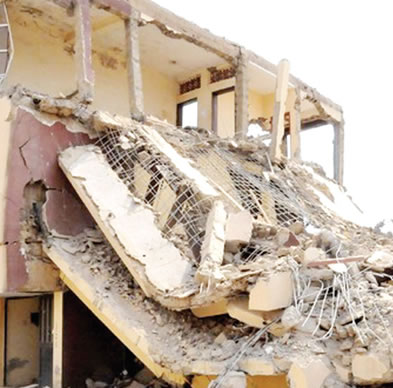
Operators in the built industry have decried the incessant building collapse in the industry, describing it as an embarrassment.
The immediate past President of the Building Collapse Prevention Guild, Kunle Awobodu said the frequency of building collapses was a cause for concern.
He said, “The frequency of building collapse is high, embarrassing, and can no longer be excused. The head of the Lagos State Ministry of Physical Planning and Urban Development is the honourable commissioner. The head is usually held accountable in a situation like this. When he assumed this position some months ago, we became hopeful and optimistic as he promised to find a lasting solution to this menace. He really needs to accelerate the process as people are becoming impatient.”
In the same vein, the National President of the Building Collapse Prevention Guild, Sulaimon Yusuf, said building collapses were denting the reputation of construction professionals.
He said, “In this global village, every news of building collapse causes incalculable damage to the reputation of the Nigerian built environment professionals. They are regarded as inferior in the eye of foreign counterparts.
“The price being paid by the Nigerian construction professionals is high in image damage due to the activities of quacks. Hence, the earlier the menace of building collapse is put to rest, the better for the practitioners in the Nigerian building industry.”
According to him, real estate and housing development have become an alternative booming business for investors, following the collapse of the stock exchange and manufacturing in Nigeria.
He claimed that many business-oriented people, who possessed no training in building construction had flooded the country’s construction sphere with little respect for professionalism and due process.
He said, “When there are no eligibility criteria, requirements or qualifications that restrict admission into a sensitive and critical sector, the consequence will endanger the much-cherished life and property. And in an all-comers affair, where professional advice is hardly adhered to, as profiteering is elevated above safety, compromise becomes the order of the day.
“The size of developers has become enormous, thereby overwhelming the government monitoring apparatus. 90 per cent of developers do not belong to the association and quite a number of them are very influential. The culture of inducement being promoted by many developers has encouraged compromise in the circles of government officials.”
Meanwhile, Sulaiman appealed to developers to abide by the building regulations and engage the appropriate professionals in the pre-construction, construction, and post-construction stages of the building.
He urged them to consider the risk involved in building construction more than the gains.
He added, “Developers embarking on multi-storey building construction should desist from direct labour method and engage the services of reputable construction companies. It is a clever way of mortgaging risk. Saving costs at the expense of human life could result in huge financial losses, chorusing the foolhardiness of penny-wise pound foolishness.
“We equally appeal to the government to lessen the burden on developers by reducing the high development fees and taxation. Expensive preliminary costs incurred in building plan approval, etc. tempt developers to cut corners.”





